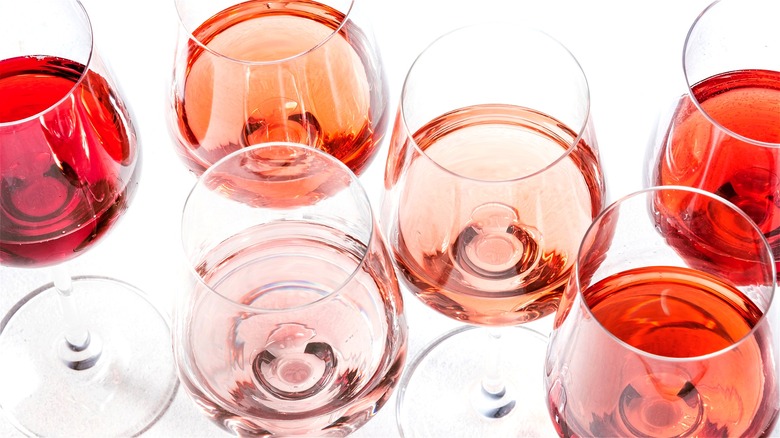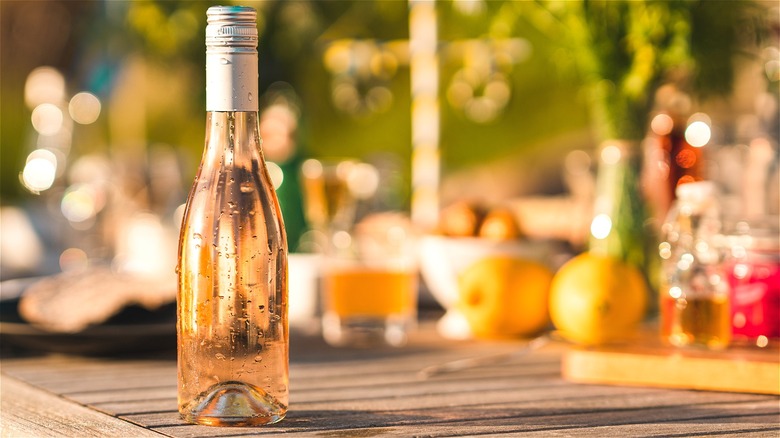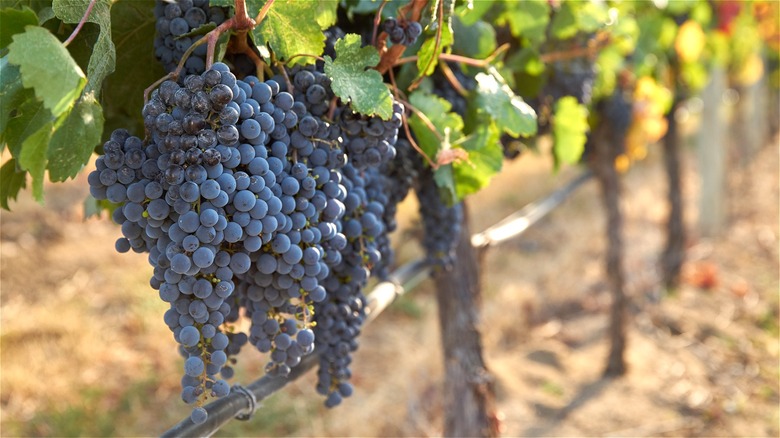How To Properly Pick Out A Rosé Like A Pro
If you enjoy unwinding with a complexly flavored beverage at the end of the day, you might consider yourself a wine person. Even though your tastes might follow the seasons with your preference for white wines in the warmer months and deep red varieties in the fall and winter, certain occasions call for a variety that spans both sides of the spectrum. You may have wondered what kind of wine rosé is in your quest to find a multi-faceted yet well-rounded choice drink.
Rosé wine is bright and refreshing yet made from the same grapes that comprise your favorite full-bodied red wines. What sets rosé apart revolves around maceration, or how long those precious grape skins are left in their residual juices before fermenting. Once the juice has taken on a pale pink color, the grape skins are typically removed one to three days later.
To flush out the uncertainty you may have in choosing your first or next rosé wine, Daily Meal recently sat down with newly appointed master sommelier Catherine Fallis. Besides being awarded this impressive title and working for Milwaukee-based wine subscription service Bright Cellars, Fallis' ultimate goal is "making wine easier for everyone to understand."
When it comes down to choosing rosé, Fallis insists consumers should rely on the advice of experts in the retail space. There are, however, a few noteworthy factors every wine connoisseur should keep in their back pocket when perusing the rosé section at their local winery or neighborhood marketplace.
The taste and storage capacity of rosé has a lot to do with color
As you decipher how to choose a rosé wine, Fallis describes how you can tell a lot about the bottle at hand based on the dark, pale, or vibrant tones of the wine's signature pink color. "Typically the paler rosé wines are less fruity, very dry and show a light minerality," compared to deeper-hued varieties often classified as full-bodied.
These deeper pink varieties are more comparable in flavor to your favorite red wine. While rosé wines contain several flavors, such as melon, raspberry, and strawberry, accompanied by a floral essence, the fresh, almost green taste of rosé makes this type of wine best suited for immediate consumption.
Even though there are a few minimal exceptions to this rule, generally, many commercial rosé wines aren't meant to last long term. Since grapes tannins or flavor compounds serve as an essential element of the aging process in red wine, a lot of that complex development is missing in many rosé varieties due to the shortened maceration time. Fallis confirms "rosé wine is not meant for aging," when she claims "99% of the wines available in retail are ready to drink now."
Apart from choosing wines from one specific region of the world where aging rosé is acceptable, a few places across the U.S. have worked to develop their own specially curated varieties of rosé wine made more for immediate consumption.
Many places around the world make specialized rosé varieties
If you're after specific rosé wines that do, in fact, age well, look no further than Provence France, where both red and rosé wines made with Mourvèdre grapes tend to pass the aging test with grace. Yet, keep in mind that with such specific varieties, you will have to pay more than the standard $10-15. You can source rosé wines that stand the test of time for roughly $20-30 online from various retailers nationwide.
Yet, for those of you who categorize rosé as one of the best types of wine for your summer barbecue, you can begin to plan and look into some of the regions of America that grow and source some genuinely unique rosé blends. Next to the central coast of California, Fallis notes Columbia Valley, Washington, where many complex and full-bodied red wines are produced, also crafts distinct white and rosé varieties. For Bright Cellars subscribers, Fallis excitedly proclaims she and her team members "sourced a delicious rosé, Cele," from Colombia Valley, which happens to be a real crowd-pleaser among wine enthusiasts. While we've covered some essential info surrounding what to look for in a proper rosé, if you're still feeling worried about finding the right variety to suit your taste buds, take Fallis' advice and don't hesitate to lean on the experts to help you find exactly what you want.


